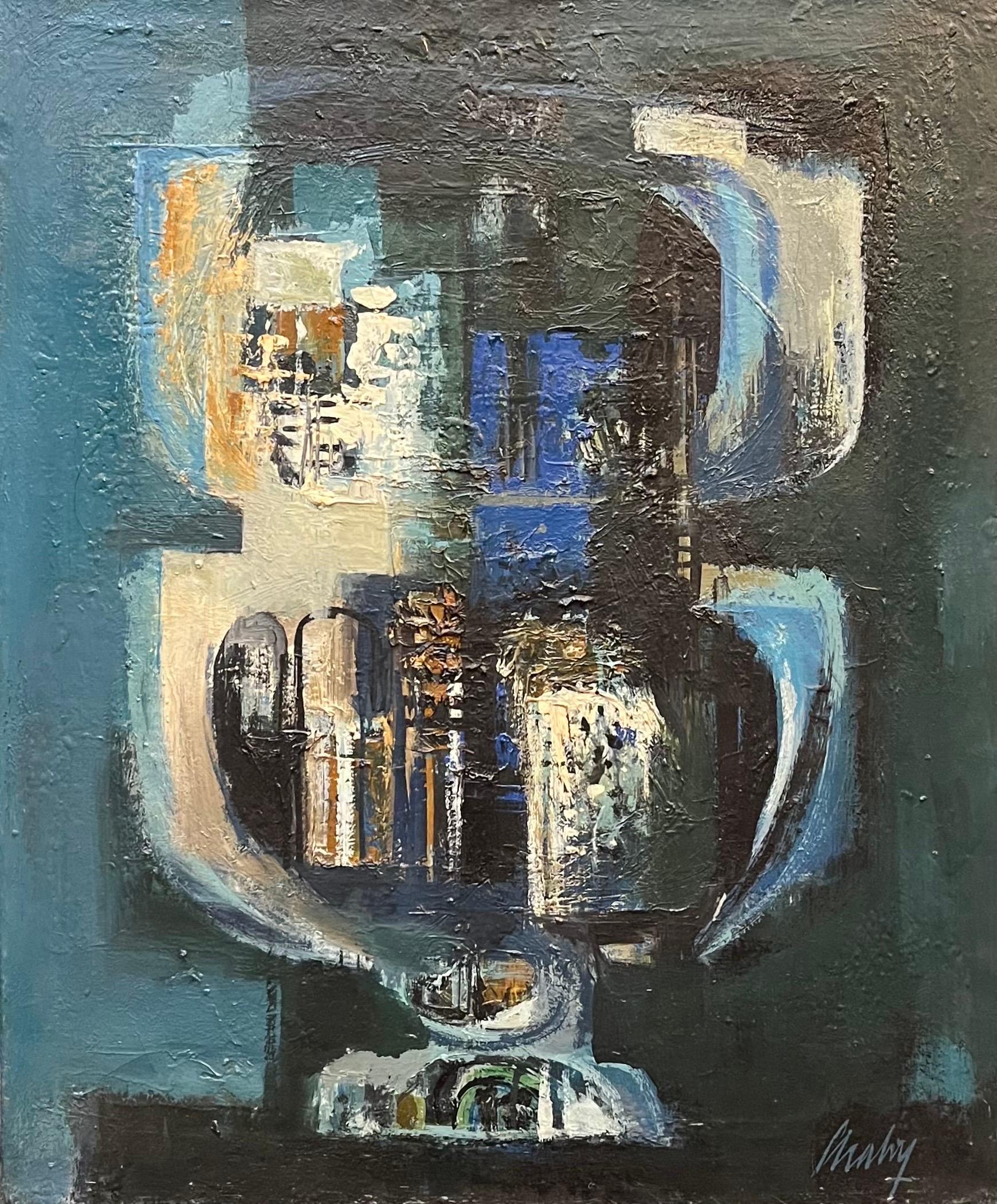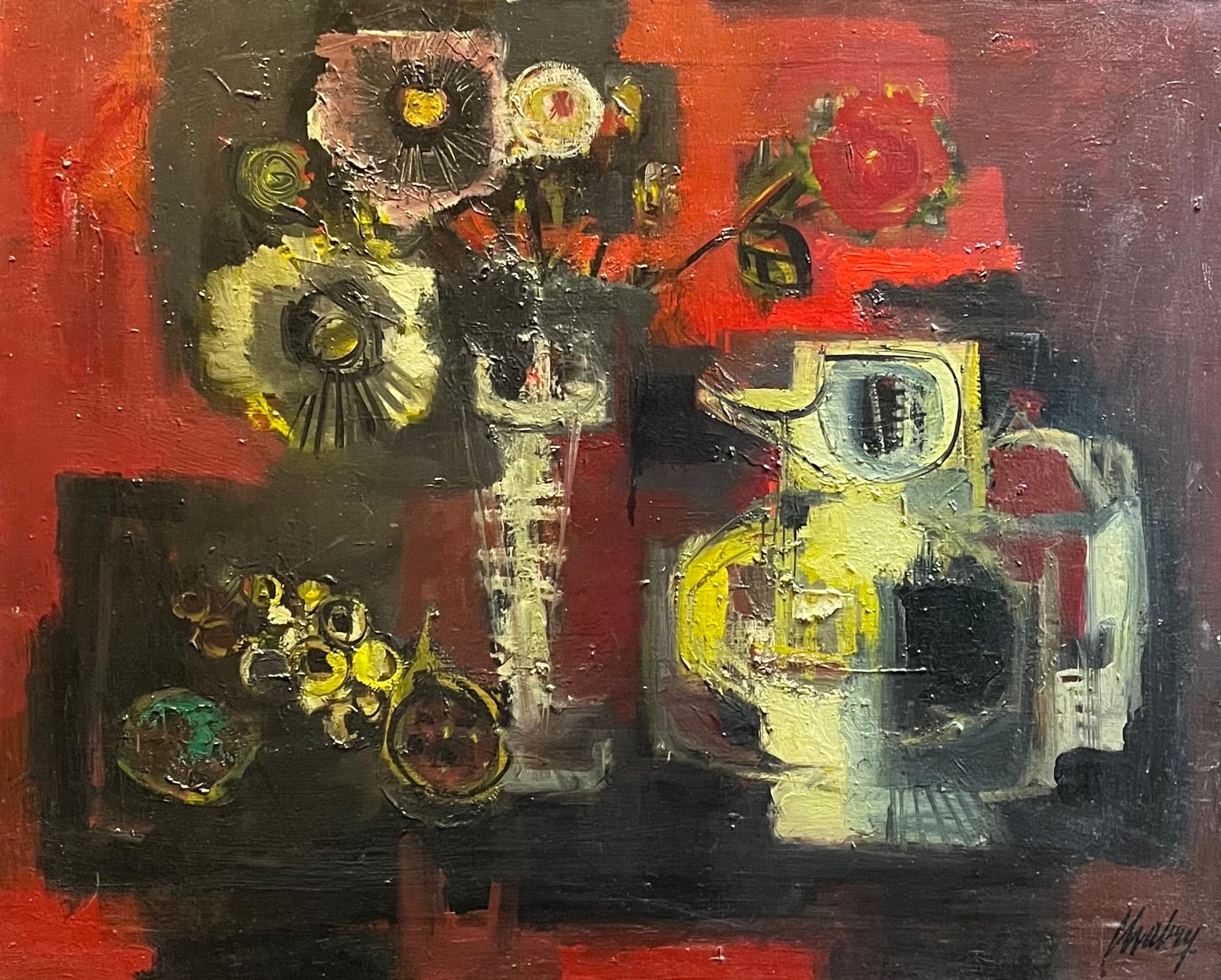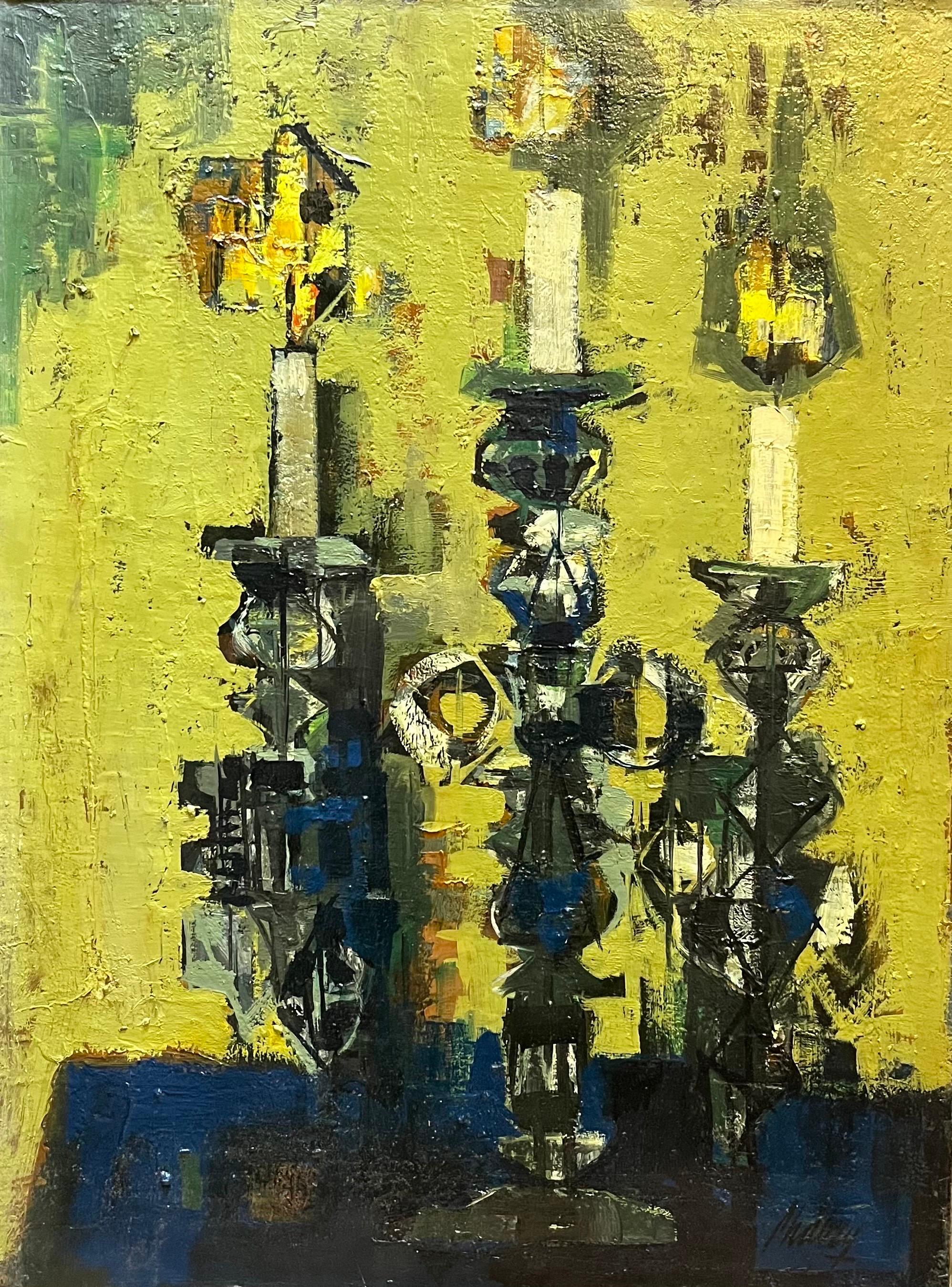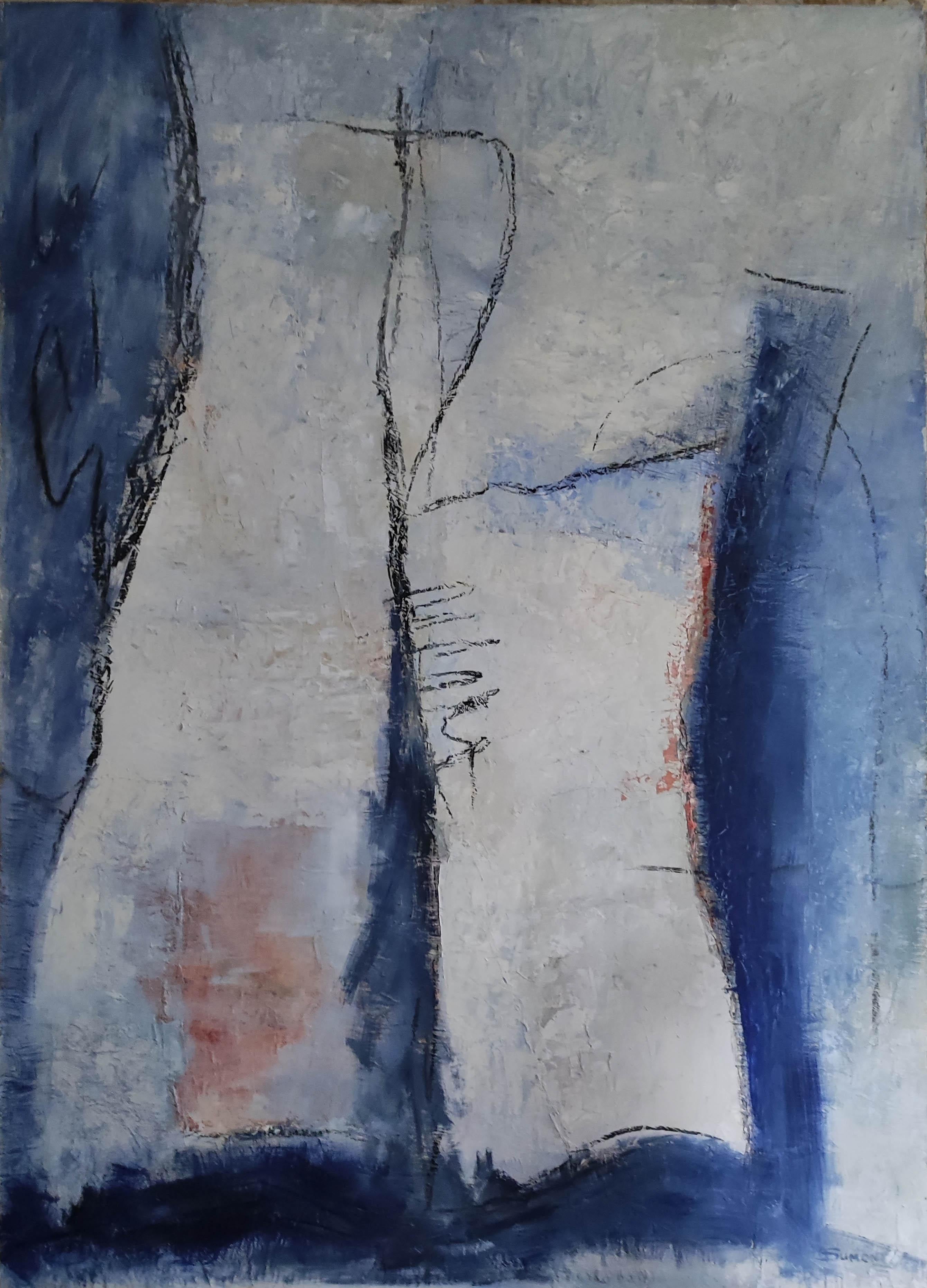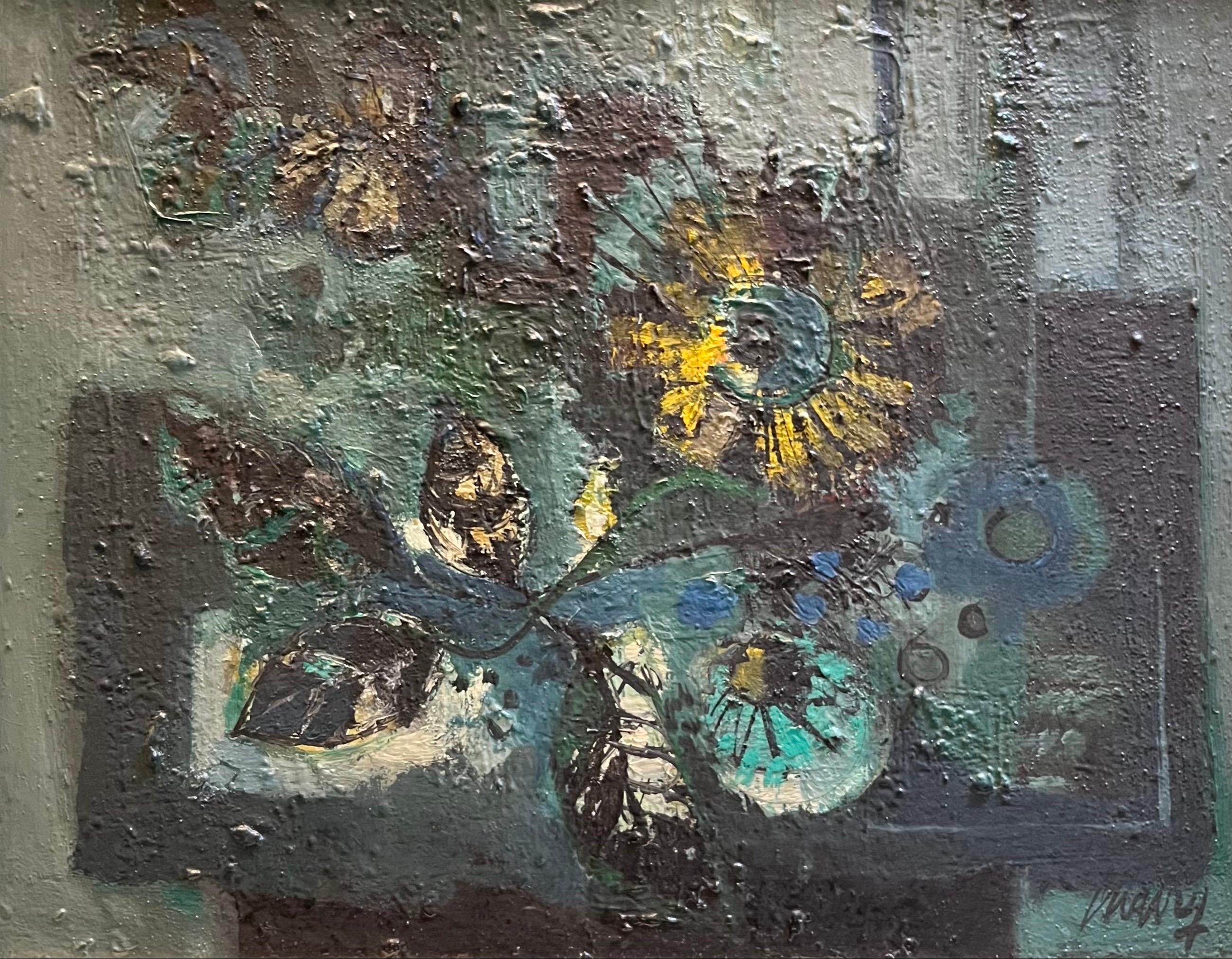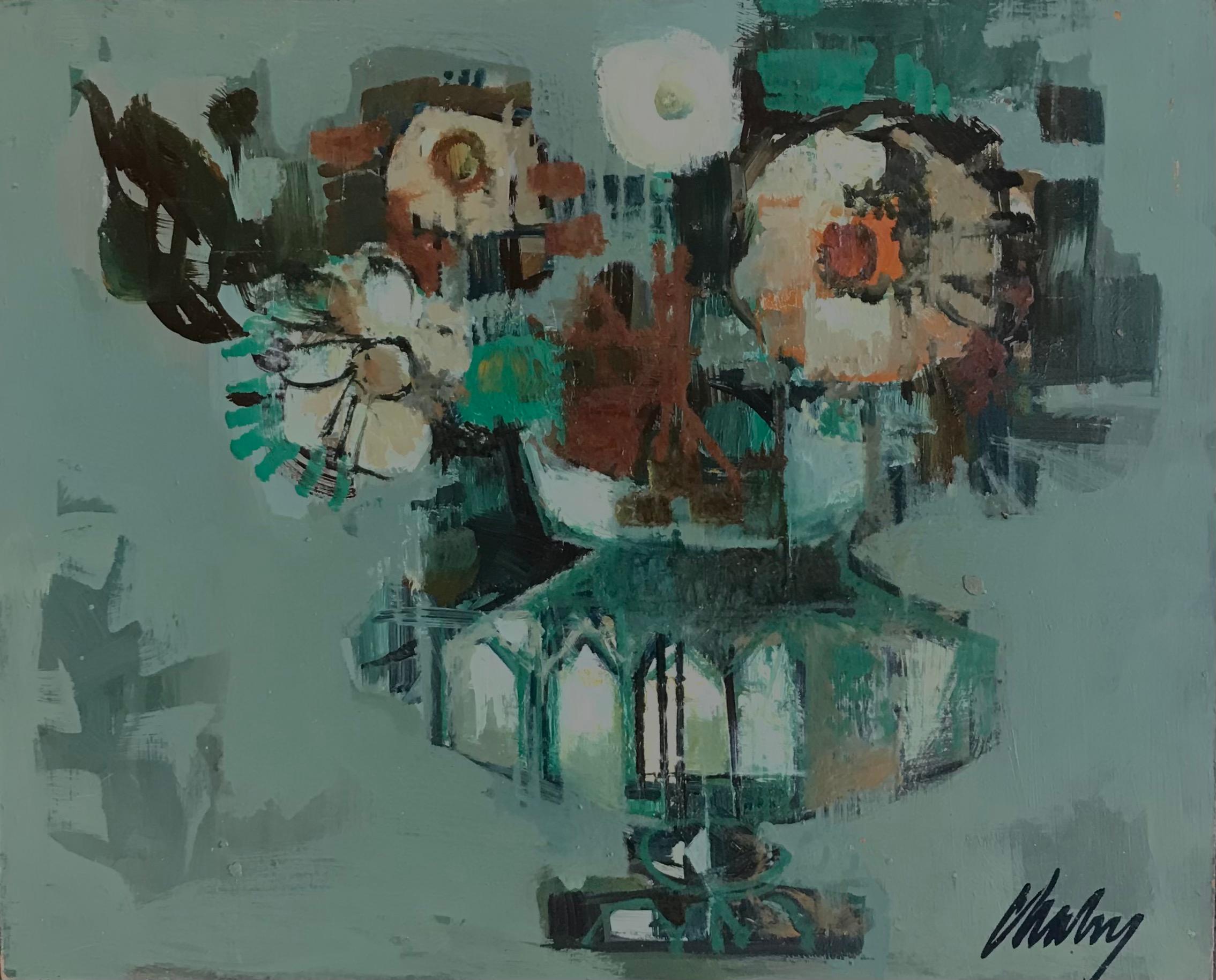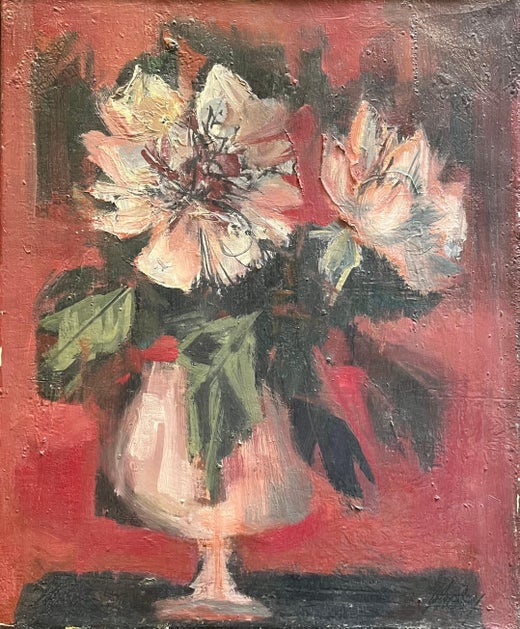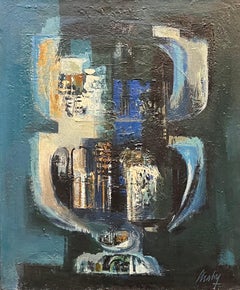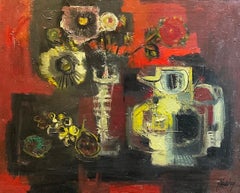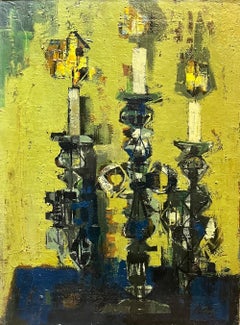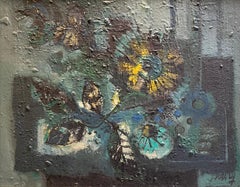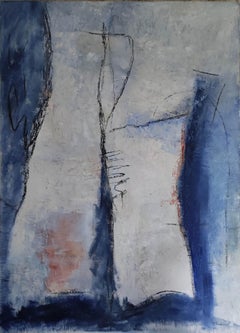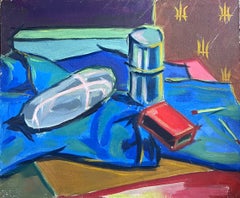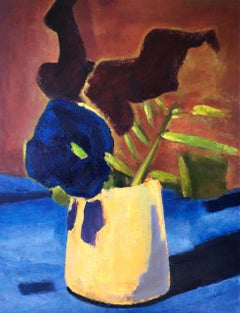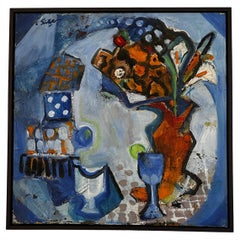Items Similar to “Blue Still Life” by Frank Chabry - Oil on Canvas/Paper 116x143 cm
Video Loading
Want more images or videos?
Request additional images or videos from the seller
1 of 12
Frank Chabry“Blue Still Life” by Frank Chabry - Oil on Canvas/Paper 116x143 cm
$4,000
£3,021.55
€3,492.06
CA$5,621.08
A$6,249.66
CHF 3,290.83
MX$75,827.21
NOK 41,663.47
SEK 38,945.19
DKK 26,059.74
About the Item
Frank Chabry (1916-1979) was a 20th-century artist whose career spanned several transformative decades in the art world. His work likely reflects the artistic evolution of the mid-20th century, influenced by movements such as modernism and post-war abstraction. Chabry's art may have incorporated themes of everyday life, nature, or abstract forms, characteristic of the period's experimentation with new techniques and perspectives. Though not widely known, his contributions hold value among collectors and art enthusiasts interested in mid-century works, and his pieces occasionally appear in exhibitions or auctions dedicated to this era.
- Creator:Frank Chabry (1916 - 1979, Swiss)
- Dimensions:Height: 45.67 in (116 cm)Width: 56.3 in (143 cm)Depth: 0.79 in (2 cm)
- Medium:
- Movement & Style:
- Period:
- Condition:
- Gallery Location:Geneva, CH
- Reference Number:1stDibs: LU1434216214612
Frank Chabry (1916-1979) was a 20th-century artist whose career spanned several transformative decades in the art world. His work likely reflects the artistic evolution of the mid-20th century, influenced by movements such as modernism and post-war abstraction. Chabry's art may have incorporated themes of everyday life, nature, or abstract forms, characteristic of the period's experimentation with new techniques and perspectives. Though not widely known, his contributions hold value among collectors and art enthusiasts interested in mid-century works, and his pieces occasionally appear in exhibitions or auctions dedicated to this era.
About the Seller
4.9
Platinum Seller
Premium sellers with a 4.7+ rating and 24-hour response times
Established in 2016
1stDibs seller since 2020
281 sales on 1stDibs
Typical response time: 2 hours
- ShippingRetrieving quote...Shipping from: Geneva, Switzerland
- Return Policy
Authenticity Guarantee
In the unlikely event there’s an issue with an item’s authenticity, contact us within 1 year for a full refund. DetailsMoney-Back Guarantee
If your item is not as described, is damaged in transit, or does not arrive, contact us within 7 days for a full refund. Details24-Hour Cancellation
You have a 24-hour grace period in which to reconsider your purchase, with no questions asked.Vetted Professional Sellers
Our world-class sellers must adhere to strict standards for service and quality, maintaining the integrity of our listings.Price-Match Guarantee
If you find that a seller listed the same item for a lower price elsewhere, we’ll match it.Trusted Global Delivery
Our best-in-class carrier network provides specialized shipping options worldwide, including custom delivery.More From This Seller
View AllBig Blue Vase by Frank Chabry - Oil on canvas 65.5x54.5 cm
Located in Geneva, CH
Frank Chabry (1916-1979) was a 20th-century artist whose career spanned several transformative decades in the art world. His work likely reflects the arti...
Category
Mid-20th Century Post-War Still-life Paintings
Materials
Canvas, Oil
Red Still Life by Frank Chabry - Oil on canvas 66x81 cm
Located in Geneva, CH
Frank Chabry (1916-1979) was a 20th-century artist whose career spanned several transformative decades in the art world. His work likely reflects the arti...
Category
Mid-20th Century Baroque Still-life Paintings
Materials
Canvas, Oil
Floral Still Life N°2 by Frank Chabry - Oil on Canvas - 73x54 cm
Located in Geneva, CH
Frank Chabry (1916-1979) was a 20th-century artist whose career spanned several transformative decades in the art world. His work likely reflects the arti...
Category
Late 20th Century Post-War Still-life Paintings
Materials
Canvas, Oil
Still Life N°2 by Frank Chabry - Oil on Canvas - 46x38 cm
Located in Geneva, CH
Frank Chabry (1916-1979) was a 20th-century artist whose career spanned several transformative decades in the art world. His work likely reflects the arti...
Category
Late 20th Century Abstract Impressionist Still-life Paintings
Materials
Canvas, Oil
Still-life by Frank Chabry - Oil on cardboard
Located in Geneva, CH
Frank Chabry (also spelled Franck Chabry) (1916–1979) was a Swiss painter and art educator born in Lausanne on April 25, 1916, and passed away in Geneva on July 29, 1979. He was the ...
Category
Late 20th Century Expressionist Still-life Paintings
Materials
Oil
Pink Still Life by Frank Chabry - Oil on canvas 54x65 cm
Located in Geneva, CH
Frank Chabry (1916-1979) was a 20th-century artist whose career spanned several transformative decades in the art world. His work likely reflects the arti...
Category
Mid-20th Century Post-War Still-life Paintings
Materials
Canvas, Oil
You May Also Like
Equilibre, Abstract, Blue, Still life, Contemporary, Oil on canvas, French art
By SOPHIE DUMONT
Located in LANGRUNE-SUR-MER, FR
In this captivating composition, Sophie Dumont explores the nuances of still life with bottles, employing an abstract treatment through the medium of oil and knife.
The carefully chosen palette, dominated by shades of blue and white, invites interpretation rather than dictation. Sophie Dumont's masterful use of the palette knife creates a dynamic interplay of texture, adding depth to the canvas. The blue tones, rich and varied, find a perfect counterbalance in the warmth of orange, creating a harmonious visual dialogue that animates the entire composition.
This artwork, left unframed, emphasizes the raw essence of the piece. However, the edges of the painting are meticulously painted, offering a polished completeness to the piece even without additional framing. The decision to leave it unframed speaks to a deliberate choice, allowing the viewer to engage directly with the artwork.
On the back, a hook is thoughtfully placed, facilitating ease of display for the collector. The artist's signature in the lower right corner adds a personal touch, marking it as an authentic creation by Sophie Dumont. Furthermore, a certificate of authenticity accompanies the artwork, assuring the provenance and originality of this abstract symphony in blue...
Category
21st Century and Contemporary Abstract Expressionist Abstract Paintings
Materials
Oil
French Modernist Still Life Colorful Oil Painting Deep Blue Colors Listed Artist
Located in Cirencester, Gloucestershire
Still Life
by Raymond Guidot
The artist, Raymond Guidot (1935 - 2021) was a Parisian art historian, critique and teacher.
oil painting on board, unframed
board: 9 x 10.5 inches
sta...
Category
Mid-20th Century Impressionist Interior Paintings
Materials
Oil
'Blue Flowers with Yellow Vase' Large Floral Contemporary Still Life
By Ming Ming
Located in Carmel, CA
Ming Ming Liang's "Blue Flowers with Yellow Vase" is a 60" x 48" oil on canvas that exudes a serene yet bold presence in the contemporary still-life genre. The painting features an i...
Category
21st Century and Contemporary Contemporary Still-life Paintings
Materials
Oil, Canvas
Still-Life Blue Tones Oil on Canvas by Edward Sotello
Located in Pasadena, CA
With this oil painting realized by the Californian artist Edward Sotello, we can clearly see on the right a glass, a vase, and some flowers placed on a table. On the left, a possible...
Category
Mid-20th Century Expressionist Still-life Paintings
Materials
Canvas, Oil
$680 Sale Price
28% Off
Still Life with Blue Kettle, Painting, Acrylic on Canvas
By Linda Bankerd
Located in Yardley, PA
An abstract still life in deep rich color; objects are barely recognizable. Painted on a deep profile canvas, this work is wired and ready to hang. :: Painting :: Abstract :: This ...
Category
2010s Abstract Abstract Paintings
Materials
Acrylic
Tall German Expressionist still life oil painting by Hans Schellinger in blues
Located in Petworth, West Sussex
Hans Schellinger (German, 1905–1990)
Cornucopia, 1970
Oil on canvas
Signed ‘Schellinger Hans’ (on the stretcher); dated ‘70’ (lower right)
47.5 x 16.5 in. (120.7 x 42 cm)
In Cornuco...
Category
20th Century Expressionist Still-life Paintings
Materials
Canvas, Oil
More Ways To Browse
Franks Oil Painting
Frank Oil Paint
Large British Landscape Painting
Large River Painting
Oil Paintings Paired
Oil Painting Renaissance
Oil Painting Black Woman
Paintings With Hats
Self Portraits By Oil
Abstract Flower Still Life
Drawings Of Churches
English School Oil Painting
American Renaissance
19th Century French Portraits
Black Woman Portrait Painting
Fantasy Oil Painting
William West
Spanish Landscape Painting Framed
